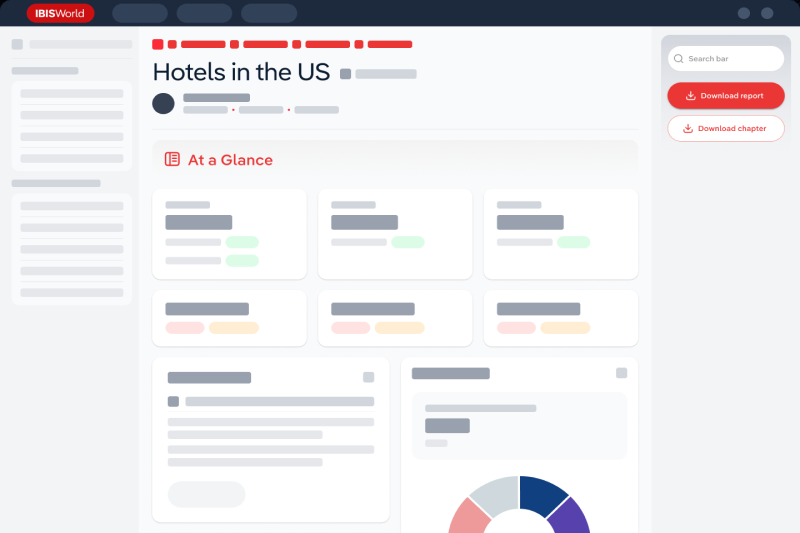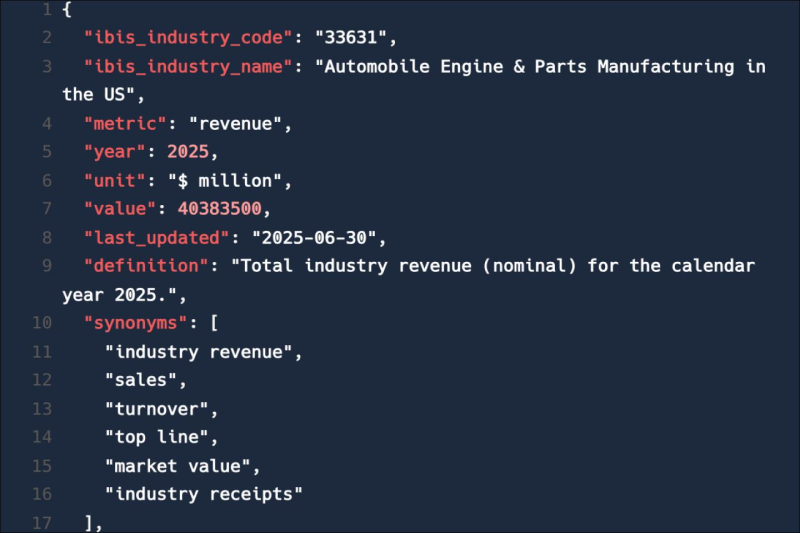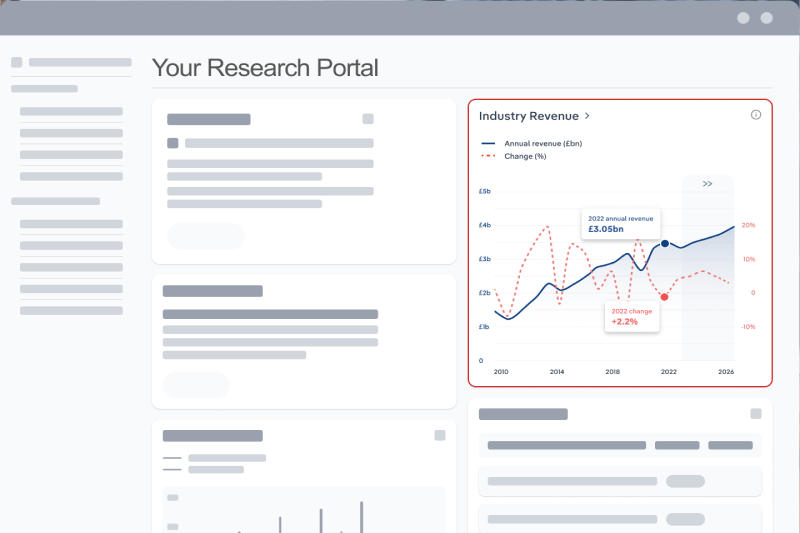IBISWorld Platform
Answer any industry question in minutes with our entire database at your fingertips.

In the past, the management consulting industry in Germany has undergone extensive change as a result of digitalisation. Consultancy firms have increasingly had to focus on supporting digital transformation in order to help companies adapt their business models to new technological requirements. Big data and artificial intelligence in particular have played a decisive role in process automation and the optimisation of operational efficiency. In addition, environmental, social and governance (ESG) consulting has become increasingly important, driven by regulatory requirements such as the EU Non-Financial Reporting Directive and the EU Taxonomy. Between 2020 and 2025, industry turnover increased by an average of 3% per year.

Answer any industry question in minutes with our entire database at your fingertips.

Feed trusted, human-driven industry intelligence straight into your platform.

Streamline your workflow with IBISWorld’s intelligence built into your toolkit.
IBISWorld's research coverage on the Management Consultants industry in Germany includes market sizing, forecasting, data and analysis from 2015-2030. The most recent publication was released August 2025.
The Management Consultants industry in Germany operates under the WZ industry code M70.22DE. This sector includes consulting, guidance and practical support for companies and other organisations in management-related issues such as strategic organisational planning, design, development and control. Consultancy activities in auditing, tax consultancy and accounting (IBISWorld sector report M69.20EN) as well as legal advice (M69.10EN) are to be distinguished from this. Related terms covered in the Management Consultants industry in Germany include change management, itk, inhouse consulting, hidden champion, artificial intelligence (ki), big data, blockchain and cloud.
Products and services covered in Management Consultants industry in Germany include Consulting services in the area of digitalisation, Consultancy services in the area of change management and Consulting services in the area of strategy and innovation.
Companies covered in the Management Consultants industry in Germany include Accenture Holding B. V. & Co. KG, McKinsey & Company, Inc. and Roland Berger Holding GmbH & Co. KGaA.
The Performance chapter covers detailed analysis, datasets, detailed current performance, sources of volatility and an outlook with forecasts for the Management Consultants industry in Germany.
Questions answered in this chapter include what's driving current industry performance, what influences industry volatility, how do successful businesses overcome volatility, what's driving the industry outlook. This analysis is supported with data and statistics on industry revenues, costs, profits, businesses and employees.
The Products and Markets chapter covers detailed products and service segmentation and analysis of major markets for the for the Management Consultants industry in Germany.
Questions answered in this chapter include how are the industry's products and services performing, what are innovations in industry products and services, what products or services do successful businesses offer and what's influencing demand from the industry's markets. This includes data and statistics on industry revenues by product and service segmentation and major markets.
The Geographic Breakdown chapter covers detailed analysis and datasets on regional performance of the Management Consultants industry in Germany.
Questions answered in this chapter include where are industry businesses located and how do businesses use location to their advantage. This includes data and statistics on industry revenues by location.
The Competitive Forces chapter covers the concentration, barriers to entry and supplier and buyer profiles in the Management Consultants industry in Germany. This includes data and statistics on industry market share concentration, barriers to entry, substitute products and buyer & supplier power.
Questions answered in this chapter include what impacts the industry's market share concentration, how do successful businesses handle concentration, what challenges do potential industry entrants face, how can potential entrants overcome barriers to entry, what are substitutes for industry services, how do successful businesses compete with substitutes and what power do buyers and suppliers have over the industry and how do successful businesses manage buyer & supplier power.
The Companies chapter covers Key Takeaways, Market Share and Companies in the Management Consultants industry in Germany. This includes data and analysis on companies operating in the industry that hold a market share greater than 5%.
Questions answered in this chapter include what companies have a meaningful market share and how each company is performing.
The External Environment chapter covers Key Takeaways, External Drivers, Regulation & Policy and Assistance in the Management Consultants industry in Germany. This includes data and statistics on factors impacting industry revenue such as economic indicators, regulation, policy and assistance programs.
Questions answered in this chapter include what demographic and macroeconomic factors impact the industry, what regulations impact the industry, what assistance is available to this industry.
The Financial Benchmarks chapter covers Key Takeaways, Cost Structure, Financial Ratios, Valuation Multiples and Key Ratios in the Management Consultants industry in Germany. This includes financial data and statistics on industry performance including key cost inputs, profitability, key financial ratios and enterprise value multiples.
Questions answered in this chapter include what trends impact industry costs and how financial ratios have changed overtime.
The Industry Data chapter includes 10 years of historical data with 5 years of forecast data covering statistics like revenue, industry value add, establishments, enterprises, employment and wages in the Management Consultants industry in Germany.
More than 6,000 businesses use IBISWorld to shape local and global economies
We were able to supplement our reports with IBISWorld’s information from both a qualitative and quantitative standpoint. All of our reporting now features some level of IBISWorld integration.

IBISWorld delivers the crisp business knowledge we need to drive our business. Whether it be serving up our major clients, winning new business or educating on industry issues, IBISWorld brings real value.

IBISWorld has revolutionised business information — which has proved commercially invaluable to exporters, investors and public policy professionals in Australia and overseas.

When you’re able to speak to clients and be knowledgeable about what they do and the state that they operate in, they’re going to trust you a lot more.

The market size of the Management Consultants industry in Germany is €47.7bn in 2026.
There are 90,441 businesses in the Management Consultants industry in Germany, which has grown at a CAGR of 3.1 % between 2020 and 2025.
The Management Consultants industry in Germany is unlikely to be materially impacted by import tariffs with imports accounting for a low share of industry revenue.
The Management Consultants industry in Germany is unlikely to be materially impacted by export tariffs with exports accounting for a low share of industry revenue.
The market size of the Management Consultants industry in Germany has been growing at a CAGR of 3.0 % between 2020 and 2025.
Over the next five years, the Management Consultants industry in Germany is expected to grow.
The biggest companies operating in the Management Consultants industry in Germany are Accenture Holding B. V. & Co. KG, McKinsey & Company, Inc. and Roland Berger Holding GmbH & Co. KGaA
Consulting services in the area of digitalisation and Consultancy services in the area of change management are part of the Management Consultants industry in Germany.
The company holding the most market share in the Management Consultants industry in Germany is Accenture Holding B. V. & Co. KG.
The level of competition is moderate and increasing in the Management Consultants industry in Germany.




